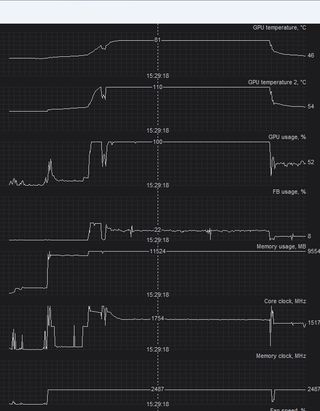For the reason that launch of AMD’s RX 7000-series with the RX 7900 XTX and RX 7900 XT, some studies have arisen suggesting that AMD-designed playing cards could also be heating as much as an uncomfortable degree—reportedly as much as 110°C on what’s referred to as the hotspot temperature studying on these playing cards. A lot in order that AMD has now admitted that there could also be a problem affecting a restricted variety of reference design playing cards.
“We’re working to find out the foundation explanation for the surprising efficiency limitation of the AMD Radeon RX 7900 XTX graphics playing cards,” AMD says in an announcement (through Hardwareluxx (opens in new tab)). “Based mostly on our observations thus far, we consider the problem is expounded to the thermal answer used within the AMD reference design and with a restricted variety of playing cards bought. We’re working to resolve this concern for the affected playing cards.
“Clients experiencing this surprising limitation ought to contact AMD Assist (opens in new tab).”
This assertion follows studies from Igor’s Lab (opens in new tab) and Computerbase (opens in new tab) which prompt a batch of playing cards might have been affected, which means various playing cards could should be returned to AMD for a repair. It has additionally been prompt by overclocker der8auer (opens in new tab) {that a} defective vapor chamber is the trigger for concern on the playing cards, although AMD has not confirmed this particular element as of but. Means of elimination would counsel that is the probably trigger, nonetheless.
In affected playing cards, der8auer discovered a a lot larger delta between GPU and GPU hotspot temperature readings than on unaffected playing cards. Primarily, affected playing cards endure from remoted hotspots far larger than the typical GPU temperature, inflicting thermal safety measures to kick in and throttle the clock velocity.
Some customers that skilled excessive temperatures have reportedly spoken to AMD help previous to this assertion solely to be advised these temperatures are regular (opens in new tab) or that an RMA was not doable on account of an open field (opens in new tab). These complaints have been handled within the time since. Whereas it is true that top temperatures could be simply fantastic in some circumstances, it is clear that these particular excessive temperatures are literally reasonably unacceptable.
Should you discover your card is affected by this concern, you must contact AMD and get it RMA’d. You possibly can examine by working an software that lists the hotspot temperature, comparable to MSI Afterburner (opens in new tab) (famous as GPU temperature 2) or HWInfo (opens in new tab).
I’ve been working our overview RX 7900 XTX (opens in new tab) to see if our card is impacted by the problem, and, sure, it did get fairly toasty beneath load. Even throughout a modest three runs of F1 22, I noticed a GPU common temperature of 72°C. Alright, that is fantastic. Ah, however 107°C hotspot temp… and rising. That’s certainly a very popular spot.
With that outcome from inside my private PC case, I made a decision to mount the XTX again into our take a look at bench, which makes use of a vertical GPU configuration. There was some discuss of this bettering temperatures considerably, although I had no such luck. The hotspot temp swiftly shot as much as 110°C, with a median GPU temp round 81°C. The clock velocity additionally dropped to round 1,754MHz, which is a rattling sight decrease than the two,300MHz Sport Clock marketed with this explicit mannequin of card.
Sadly this clock velocity discrepancy on the XTX is nothing new, it is likely one of the issues I level out as odd in my overview. Nevertheless, the Frameview software program we use for energy and thermal measurements does not document hotspot temperature, solely common temperature, in order that essential piece of data flew beneath the radar. As compared, the RX 7900 XT (opens in new tab), which is reportedly not affected acutely by the XTX’s concern, doesn’t see such a big dip in clock velocity.
I will look additional into our card’s warmth concern and get in contact with AMD to see about additional investigation. Should you’re positive you are additionally affected, now’s the time to succeed in out to AMD help.















